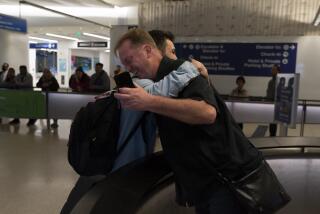Prisoner’s Release Spurs Lindh to Ask for Clemency
- Share via
SAN FRANCISCO — Buoyed by the impending release of accused “enemy combatant” Yaser Esam Hamdi, attorneys for John Walker Lindh filed a request for clemency with the Bush administration Tuesday, asking that his 20-year sentence, the second-longest in the war on terrorism, be commuted.
Lindh, a 23-year-old from Marin County who gained worldwide notoriety as the “American Taliban,” has been in U.S. custody since late 2001, when he surrendered while fighting in Afghanistan. Captured alongside him was Hamdi, another young American whose experience shouldering a rifle for the Taliban closely mirrored Lindh’s military journey through Central Asia.
“They were found in the same place and surrendered together, and they never, ever fought against Americans,” Lindh’s lead attorney, James J. Brosnahan, said at a news conference.
With Hamdi scheduled this week to be deported to Saudi Arabia, where he also is a citizen, Brosnahan said Lindh “should be able to look and see that he too has a future.”
The United States decided to release Hamdi, 24, after the Supreme Court ruled this summer that the government could no longer hold him without charges or access to lawyers.
The attempt by Lindh’s lawyers to compare their client to Hamdi was met unenthusiastically in Washington.
White House officials said they would wait for the Justice Department to make a recommendation. They noted that in nearly four years in office, President Bush had granted only two commutations -- and those were for minor offenses.
Chief spokesman for the Justice Department Mark Corallo said there were deep differences between Lindh and Hamdi.
“John Walker Lindh pleaded guilty in a court of law, with his lawyers standing beside him, to supporting the Taliban,” Corallo said. “The Taliban was a brutal regime which harbored and assisted Al Qaeda. We are currently conducting a global war on terrorism against Al Qaeda and remnants of the Taliban.”
In contrast, he said, “Mr. Hamdi never appeared in a court of law. He was held as an enemy combatant, and it was determined that he was no longer a significant threat to the United States. So, like other [onetime enemy combatants], he could be transferred back to his home country.”
Margaret Love, who as the U.S. pardon attorney from 1990 to 1997 made clemency recommendations to two presidents, said Tuesday that although disparity in the treatment of two defendants often is grounds for clemency, she believed that the Lindh request was coming too soon.
“John Walker Lindh was a poster boy for everything after 9/11,” she said. “Sometimes that’s just the way things are. But eventually
Lindh is being held at the federal prison in Victorville. Since arriving there, his family and attorneys said, he has spent his time reading, studying the Koran and -- as stipulated in his plea agreement -- attempting to help authorities in their fight against terrorism.
He is not allowed to communicate with the media, a restriction his lawyers cited in declining to release a copy of the commutation petition or the narrative Lindh was invited to give explaining why he should be freed.
But at the news conference, his lawyers asserted a number of similarities between his case and Hamdi’s.
Both men were born in the United States -- Lindh in Washington, D.C., and Hamdi in Louisiana. Hamdi’s Saudi Arabian parents were in this country on a temporary work visa.
Lindh entered Afghanistan in early June 2001, a month before Hamdi went to that country; both received training with the Taliban army before the Sept. 11 attacks.
Each man, Lindh’s lawyers said, “deployed with his Taliban unit in northeastern Afghanistan, where Taliban forces were engaged in battle with the Northern Alliance,” an Afghan opposition force.
“No U.S. ground troops were ever engaged in battle with the Taliban in this region,” they said.
And, the lawyers said, there was no evidence that either man fought against the U.S. troops who swept through Afghanistan to oust the Taliban government and hunt for Al Qaeda leader Osama bin Laden.
The lawyers said details of the men’s surrenders were also similar. Their Taliban units had turned themselves in to Northern Alliance forces in late 2001 near Kunduz, the attorneys said. After surrendering, Lindh and Hamdi were sent to a fortress near Mazar-i-Sharif and, after a prisoner uprising there, they were taken to a prison at Sheberghan.
That is where their paths diverged, the lawyers said.
At Sheberghan, the U.S. military took custody of Hamdi and transferred him to the U.S. naval base at Guantanamo Bay, Cuba. It was not until after authorities discovered that he had dual U.S.-Saudi citizenship that Hamdi was moved to a military brig in the United States.
He was designated an enemy combatant and received no legal representation until last June, when the Supreme Court said he had a right to a lawyer and the right to defend himself in a U.S. court because of his American citizenship.
Shortly after that ruling, Hamdi was given a federal public defender. Negotiations with the government resulted in a court filing permitting Hamdi to be sent to Saudi Arabia in exchange for renouncing his American citizenship and agreeing to travel restrictions.
Lindh’s experience was markedly different. His picture was beamed around the world, especially after a video surfaced showing CIA agent Johnny “Mike” Spann attempting to interrogate him. Spann was later killed in the prison uprising.
Lindh was brought to the United States and charged in a 10-count indictment with conspiring to kill Americans, including Spann, and aiding the Al Qaeda terrorist network.
In July 2002, he pleaded guilty to serving as a soldier for the Taliban and to carrying a rifle and hand grenades while doing so.
In return, the other charges were dropped.
Had he gone to trial on all the charges, Lindh could have faced life in prison.
“That summer of 2002, this country was in a high state of fear, anger and mourning,” Brosnahan said Tuesday. “There was no practical alternative at that time to talking to the government when they raised the matter of a plea with us.”
Paul J. McNulty, the U.S. attorney for the Eastern District of Virginia, said of the Lindh case at the time: “This is a tough sentence. This is an appropriate sentence.”
Except for the life sentence given to “shoe bomber” Richard Reid, who also pleaded guilty, no one else arrested in the anti-terrorism fight has received as harsh a punishment as Lindh. Almost all have pleaded guilty, often for sentences of eight to 10 years, but others for as short as a single year in prison.
It is this disparity that the Lindh family and his lawyers hope will convince Bush.
Said his mother, Marilyn Walker: “I hope America can find it in her heart to forgive John.”
*
Serrano reported from Washington and Romney from San Francisco. Times staff writer Megan K. Stack in Saudi Arabia contributed to this report.
More to Read
Sign up for Essential California
The most important California stories and recommendations in your inbox every morning.
You may occasionally receive promotional content from the Los Angeles Times.















